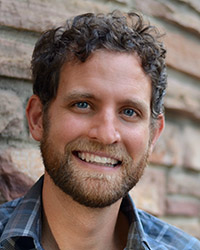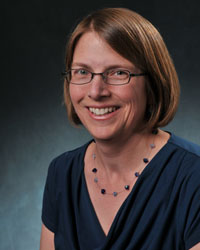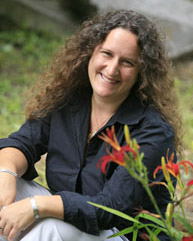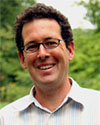Faculty Affiliates
Waleed Abdalati
 Dr. Waleed Abdalati is Director of the Cooperative Institute for Research in Environmental Sciences at the University of Colorado Boulder. His research interests are in the use of satellite and airborne remote sensing techniques, integrated with in situ observations and modeling, to understand how and why the Earth's ice cover is changing, and what those changes mean for life on Earth. Most of his research is supported by NASA, where he worked as a scientist for 12 years, before joining CIRES. In 2011, Waleed returned to NASA on a two-year assignment as the agency's Chief Scientist, serving as principal adviser to the NASA Administrator on NASA scienceprograms, strategic planning, and the evaluation of related investments.
Dr. Waleed Abdalati is Director of the Cooperative Institute for Research in Environmental Sciences at the University of Colorado Boulder. His research interests are in the use of satellite and airborne remote sensing techniques, integrated with in situ observations and modeling, to understand how and why the Earth's ice cover is changing, and what those changes mean for life on Earth. Most of his research is supported by NASA, where he worked as a scientist for 12 years, before joining CIRES. In 2011, Waleed returned to NASA on a two-year assignment as the agency's Chief Scientist, serving as principal adviser to the NASA Administrator on NASA scienceprograms, strategic planning, and the evaluation of related investments.
Cassandra Brooks
 Cassandra Brooks recently completed her PhD with the Emmett Interdisciplinary Program in Environment and Resources at Stanford University studying international ocean policy, with a focus on marine protection in the Antarctic. During her previous graduate work, she studied Antarctic toothfish in the Ross Sea - the most remote fishery on Earth. Cassandra has worked in the lab, underwater, and at sea and has presented her work at conferences and workshops both nationally and internationally, while publishing in peer-reviewed journals including Science and Nature. She's toiled as a federal fisheries observer on New England groundfish boats and spent a number of years devoted to wilderness therapy and environmental education throughout the United States. In addition to her science, Cassandra has published more than 150 articles and multi-media stories about marine science and the environment. She's worked with international non-profits to produce media to promote policy designed to protect ecologically important regions of the globe while writing policy reports to identify important areas for marine protection in the Antarctic and elsewhere. Since completing her dissertation, she's continued to work at the intersection of science, policy and the public, working towards conservation in the Antarctic and beyond.
Cassandra Brooks recently completed her PhD with the Emmett Interdisciplinary Program in Environment and Resources at Stanford University studying international ocean policy, with a focus on marine protection in the Antarctic. During her previous graduate work, she studied Antarctic toothfish in the Ross Sea - the most remote fishery on Earth. Cassandra has worked in the lab, underwater, and at sea and has presented her work at conferences and workshops both nationally and internationally, while publishing in peer-reviewed journals including Science and Nature. She's toiled as a federal fisheries observer on New England groundfish boats and spent a number of years devoted to wilderness therapy and environmental education throughout the United States. In addition to her science, Cassandra has published more than 150 articles and multi-media stories about marine science and the environment. She's worked with international non-profits to produce media to promote policy designed to protect ecologically important regions of the globe while writing policy reports to identify important areas for marine protection in the Antarctic and elsewhere. Since completing her dissertation, she's continued to work at the intersection of science, policy and the public, working towards conservation in the Antarctic and beyond.
David Ciplet
 David Ciplet is a sociologist focused on understanding how relationships of power, ideas, and institutions in environmental governance both hinder and strengthen efforts for a more socially just society. His current research builds directly upon the themes discussed above in two ways. First, he is collaboratively studying how the governance of international renewable energy projects shape inequality, particularly as it relates to the lack of energy access in many parts of the world. Second, he is investigating the conditions under which activist and advocacy campaigns have found success in efforts to persuade private and public banks to divest from fossil fuels and to adopt related rights protections. Ciplet's research has been featured in journals such as Global Environmental Politics, Global Environmental Change, Review of International Political Economy, and International Studies Quarterly. With a commitment to broadening the public conversation on climate justice, his work has also been featured in media outlets including, The New York Times, Washington Post, The Guardian, Bloomberg Businessweek, Reuters, Radio Australia, and The International Herald Tribune. Ciplet is passionate about research and teaching that engages directly with community and policy organizations to work for social and and environmental justice. He is recipient of the Robert Dentler Award for Outstanding Achievement, from the American Sociological Association Section on Sociological Practice and Public Sociology and is a Switzer Fellow alumnus. He works to create a classroom environment where students can engage critically and directly with real world problems. This includes running a student radio project with KGNU Radio station, called the Brink. At CU Boulder, he teaches courses including Foundations of Environmental Justice; Waste and Justice; and Power, Justice and Climate Change.
David Ciplet is a sociologist focused on understanding how relationships of power, ideas, and institutions in environmental governance both hinder and strengthen efforts for a more socially just society. His current research builds directly upon the themes discussed above in two ways. First, he is collaboratively studying how the governance of international renewable energy projects shape inequality, particularly as it relates to the lack of energy access in many parts of the world. Second, he is investigating the conditions under which activist and advocacy campaigns have found success in efforts to persuade private and public banks to divest from fossil fuels and to adopt related rights protections. Ciplet's research has been featured in journals such as Global Environmental Politics, Global Environmental Change, Review of International Political Economy, and International Studies Quarterly. With a commitment to broadening the public conversation on climate justice, his work has also been featured in media outlets including, The New York Times, Washington Post, The Guardian, Bloomberg Businessweek, Reuters, Radio Australia, and The International Herald Tribune. Ciplet is passionate about research and teaching that engages directly with community and policy organizations to work for social and and environmental justice. He is recipient of the Robert Dentler Award for Outstanding Achievement, from the American Sociological Association Section on Sociological Practice and Public Sociology and is a Switzer Fellow alumnus. He works to create a classroom environment where students can engage critically and directly with real world problems. This includes running a student radio project with KGNU Radio station, called the Brink. At CU Boulder, he teaches courses including Foundations of Environmental Justice; Waste and Justice; and Power, Justice and Climate Change.
Deserai Crow
 Associate Professor Deserai Crow researches local and state-level environmental policy, including stakeholder participation and influence, information sources used, and policy outcomes. Her work often focuses on natural disaster recovery and risk mitigation in local communities and natural resource agencies. Dr. Crow’s natural hazards work includes a study of community flood recovery and policy learning in the aftermath of the 2013 floods in Colorado that is funded by the National Science Foundation. Another project analyzes the role of agencies and individuals in promoting wildfire risk mitigation on private property in the Wildland Urban Interface across the West. Prior to her academic work, she worked as a broadcast journalist and for the U.S. Fish and Wildlife Service. Dr. Crow is also the director of the MPA concentration in Homeland Security and Emergency Management at the School of Public Affairs. Crow earned her PhD from Duke University’s Nicholas School of the Environment in Environmental Policy. She also holds a Master of Public Administration from the University of Colorado Denver School of Public Affairs and a B.S. in Journalism from the University of Colorado Boulder.
Associate Professor Deserai Crow researches local and state-level environmental policy, including stakeholder participation and influence, information sources used, and policy outcomes. Her work often focuses on natural disaster recovery and risk mitigation in local communities and natural resource agencies. Dr. Crow’s natural hazards work includes a study of community flood recovery and policy learning in the aftermath of the 2013 floods in Colorado that is funded by the National Science Foundation. Another project analyzes the role of agencies and individuals in promoting wildfire risk mitigation on private property in the Wildland Urban Interface across the West. Prior to her academic work, she worked as a broadcast journalist and for the U.S. Fish and Wildlife Service. Dr. Crow is also the director of the MPA concentration in Homeland Security and Emergency Management at the School of Public Affairs. Crow earned her PhD from Duke University’s Nicholas School of the Environment in Environmental Policy. She also holds a Master of Public Administration from the University of Colorado Denver School of Public Affairs and a B.S. in Journalism from the University of Colorado Boulder.
Katie Dickinson
 Katie Dickinson is an Assistant Professor in the Colorado School of Public Health's Department of Environmental and Occupational Health, located on the University of Colorado's Anschutz Medical Campus. An environmental economist by training, her interdisciplinary research examines human behaviors and decision making in the face of environmental and health risks. She is particularly interested in the role of social interactions and social networks in shaping risk perceptions and behaviors.
Katie Dickinson is an Assistant Professor in the Colorado School of Public Health's Department of Environmental and Occupational Health, located on the University of Colorado's Anschutz Medical Campus. An environmental economist by training, her interdisciplinary research examines human behaviors and decision making in the face of environmental and health risks. She is particularly interested in the role of social interactions and social networks in shaping risk perceptions and behaviors.
Lisa Dilling
 Lisa Dilling is Assistant Professor of Environmental Studies and a Fellow of the Cooperative Institute for Research in Environmental Sciences (CIRES) at the University of Colorado Boulder. She studies decision making, the use of information and science policies related to climate change, adaptation, and carbon management. Her current projects examine drought in urban water systems, water governance and climate change, municipal adaptation to hazards, and public lands management in the context of climate change. She has authored numerous articles and is co-editor of the book, Creating a Climate for Change: Communicating climate change and facilitating social change from Cambridge University Press.
Lisa Dilling is Assistant Professor of Environmental Studies and a Fellow of the Cooperative Institute for Research in Environmental Sciences (CIRES) at the University of Colorado Boulder. She studies decision making, the use of information and science policies related to climate change, adaptation, and carbon management. Her current projects examine drought in urban water systems, water governance and climate change, municipal adaptation to hazards, and public lands management in the context of climate change. She has authored numerous articles and is co-editor of the book, Creating a Climate for Change: Communicating climate change and facilitating social change from Cambridge University Press.
Mara J. Goldman
 Mara J. Goldman is an associate professor in the Department of Geography and a faculty associate in the Institute for Behavioral Sciences at the University of Colorado-Boulder. She received her PhD from the University of Wisconsin-Madison (geography) and was a post-doctoral fellow at the International Livestock Research Institute (ILRI), in Nairobi, where she conducted research on "Communication and the Politics of Participation in Pastoral Societies." Goldman's research is situated in human-environment geography and can best be described as political ecology with a focus on questions of empowerment, access to resources, knowledge, and decision-making processes. Specific research projects focus on the following overlapping areas: the politics of wildlife conservation (knowledge and practice); the politics of participation and knowledge regarding natural resource management and development; changing resource governance, knowledge, and ecologies as related to climate change in semi-arid rangelands; the gendered dynamics of resource access and use, and women's empowerment processes.
Mara J. Goldman is an associate professor in the Department of Geography and a faculty associate in the Institute for Behavioral Sciences at the University of Colorado-Boulder. She received her PhD from the University of Wisconsin-Madison (geography) and was a post-doctoral fellow at the International Livestock Research Institute (ILRI), in Nairobi, where she conducted research on "Communication and the Politics of Participation in Pastoral Societies." Goldman's research is situated in human-environment geography and can best be described as political ecology with a focus on questions of empowerment, access to resources, knowledge, and decision-making processes. Specific research projects focus on the following overlapping areas: the politics of wildlife conservation (knowledge and practice); the politics of participation and knowledge regarding natural resource management and development; changing resource governance, knowledge, and ecologies as related to climate change in semi-arid rangelands; the gendered dynamics of resource access and use, and women's empowerment processes.
Bruce Goldstein
 Bruce is an Associate Professor in the Program in Environmental Design and the Program in Environmental Studies at the University of Colorado Boulder, and a faculty research associate in the Institute for Behavioral Science. His work focuses on how planners, activists, public agency managers and other stakeholders collaborate to address daunting social-ecological challenges, such as restoring fire regimes in a densely populated wildlands-urban interface, harmonizing common-property resource management with international efforts to protect biodiversity, and of course climate change. Bruce is particularly interested in how learning networks can catalyze change in stable and durable institutions that are approaching dramatic social and ecological thresholds. His past work includes a 6-year study of the U.S. Fire Learning Network, a novel multi-scalar collaborative approach to restoring disrupted fire regimes across multi-jurisdictional landscapes, and the edited book “Collaborative Resilience: Moving Through Crisis to Opportunity” (MIT Press 2011), which focuses on how crises can be opportunities for collaboration, consensus building, and transformative resilience. Currently, Bruce is collaborating with members of my project team on four projects - a community and network-scale resilience assessment in partnership with the Fire Adapted Communities Learning Network, a study of critical infrastructures within the Rockefeller Foundation’s 100 Resilient Cities Initiative, design and implementation of a nation-wide STEM learning network, and a study of the Locally-Managed Marine Areas Network in the South Pacific.
Bruce is an Associate Professor in the Program in Environmental Design and the Program in Environmental Studies at the University of Colorado Boulder, and a faculty research associate in the Institute for Behavioral Science. His work focuses on how planners, activists, public agency managers and other stakeholders collaborate to address daunting social-ecological challenges, such as restoring fire regimes in a densely populated wildlands-urban interface, harmonizing common-property resource management with international efforts to protect biodiversity, and of course climate change. Bruce is particularly interested in how learning networks can catalyze change in stable and durable institutions that are approaching dramatic social and ecological thresholds. His past work includes a 6-year study of the U.S. Fire Learning Network, a novel multi-scalar collaborative approach to restoring disrupted fire regimes across multi-jurisdictional landscapes, and the edited book “Collaborative Resilience: Moving Through Crisis to Opportunity” (MIT Press 2011), which focuses on how crises can be opportunities for collaboration, consensus building, and transformative resilience. Currently, Bruce is collaborating with members of my project team on four projects - a community and network-scale resilience assessment in partnership with the Fire Adapted Communities Learning Network, a study of critical infrastructures within the Rockefeller Foundation’s 100 Resilient Cities Initiative, design and implementation of a nation-wide STEM learning network, and a study of the Locally-Managed Marine Areas Network in the South Pacific.
Jill Lindsey Harrison
 Jill Lindsey Harrison (PhD, University of California at Santa Cruz, 2006) is Associate Professor of Sociology at the University of Colorado at Boulder. Her research focuses on environmental sociology, sociology of agriculture and food systems, environmental justice, political theories of justice, and immigration politics, with a regional emphasis on the United States. She has used her research on political conflict over agricultural pesticide poisonings in California, recent escalations in immigration enforcement in rural Wisconsin, and government agencies' environmental justice efforts to help identify and explain the persistence of environmental inequalities and workplace inequalities in the United States today. In addition to numerous articles and chapters, she published Pesticide Drift and the Pursuit of Environmental Justice (MIT Press, 2011), which won book awards from the Rural Sociological Society and the Association of Humanist Sociology.
Jill Lindsey Harrison (PhD, University of California at Santa Cruz, 2006) is Associate Professor of Sociology at the University of Colorado at Boulder. Her research focuses on environmental sociology, sociology of agriculture and food systems, environmental justice, political theories of justice, and immigration politics, with a regional emphasis on the United States. She has used her research on political conflict over agricultural pesticide poisonings in California, recent escalations in immigration enforcement in rural Wisconsin, and government agencies' environmental justice efforts to help identify and explain the persistence of environmental inequalities and workplace inequalities in the United States today. In addition to numerous articles and chapters, she published Pesticide Drift and the Pursuit of Environmental Justice (MIT Press, 2011), which won book awards from the Rural Sociological Society and the Association of Humanist Sociology.
Phaedra Pezzullo
 Phaedra C. Pezzullo is Associate Professor of Rhetoric & Culture in the Department of Communication in the College of Media, Communication, & Information at the University of Colorado at Boulder. She is author of Toxic Tourism: Rhetorics of Travel, Pollution, and Environmental Justice (University of Alabama Press, 2007), which won four book awards, including the Jane Jacobs Book Award from the Urban Communication Foundation. Pezzullo also has coauthored with Robert Cox Environmental Communication and the Public Sphere, 4th Ed. (Sage, 2016), edited Cultural Studies and the Environment, Revisited (Routledge, 2010), and coedited Environmental Justice and Environmentalism: The Social Justice Challenge to Environmental Movements with Ronald Sandler (MIT Press, 2007). In 2015, Pezzullo served as the head of the International Environmental Communication Association’s Climate Negotiations Working Group at the 21st session of the Conference of the Parties to the United Nations Framework Convention on Climate Change (UNFCCC)/COP21. She has served on and consulted with the American Bar Association’s Environment, Energy, and Resources committee, the Sierra Club’s national Environmental Justice Committee, BoulderTalks (Director), the Just Transition Collaborative. For more about Prof. Pezzullo, check out her website.
Phaedra C. Pezzullo is Associate Professor of Rhetoric & Culture in the Department of Communication in the College of Media, Communication, & Information at the University of Colorado at Boulder. She is author of Toxic Tourism: Rhetorics of Travel, Pollution, and Environmental Justice (University of Alabama Press, 2007), which won four book awards, including the Jane Jacobs Book Award from the Urban Communication Foundation. Pezzullo also has coauthored with Robert Cox Environmental Communication and the Public Sphere, 4th Ed. (Sage, 2016), edited Cultural Studies and the Environment, Revisited (Routledge, 2010), and coedited Environmental Justice and Environmentalism: The Social Justice Challenge to Environmental Movements with Ronald Sandler (MIT Press, 2007). In 2015, Pezzullo served as the head of the International Environmental Communication Association’s Climate Negotiations Working Group at the 21st session of the Conference of the Parties to the United Nations Framework Convention on Climate Change (UNFCCC)/COP21. She has served on and consulted with the American Bar Association’s Environment, Energy, and Resources committee, the Sierra Club’s national Environmental Justice Committee, BoulderTalks (Director), the Just Transition Collaborative. For more about Prof. Pezzullo, check out her website.
Paul Sutter
 Paul Sutter is an Associate Professor of History and Core Faculty in Environmental Studies at the University of Colorado Boulder. He is the author of Driven Wild: How the Fight against Automobiles Launched the Modern Wilderness Movement 2002) and Let Us Now Praise Famous Gullies: Providence Canyon and the Soils of the South (2015). He has also co-authored of The Art of Managing Longleaf: A Personal History of the Stoddard Neel Approach (with Leon Neel and Albert Way, 2010), and co-edited Environmental History and the American South: A Reader (with Christopher Manganiello, 2009). His current book project "Pulling the Teeth of the Tropics: Environment, Disease, Race, and the U.S. Sanitary Program in Panama, 1904-1914" is an environmental and public health history of the construction of the Panama Canal. Dr. Sutter has also written a number of influential essays on environmental historiography, including a recent state-of-the-field essay in the Journal of American History (June 2013), and he is the Series Editor for Weyerhaeuser Environmental Books, published by the University of Washington Press.
Paul Sutter is an Associate Professor of History and Core Faculty in Environmental Studies at the University of Colorado Boulder. He is the author of Driven Wild: How the Fight against Automobiles Launched the Modern Wilderness Movement 2002) and Let Us Now Praise Famous Gullies: Providence Canyon and the Soils of the South (2015). He has also co-authored of The Art of Managing Longleaf: A Personal History of the Stoddard Neel Approach (with Leon Neel and Albert Way, 2010), and co-edited Environmental History and the American South: A Reader (with Christopher Manganiello, 2009). His current book project "Pulling the Teeth of the Tropics: Environment, Disease, Race, and the U.S. Sanitary Program in Panama, 1904-1914" is an environmental and public health history of the construction of the Panama Canal. Dr. Sutter has also written a number of influential essays on environmental historiography, including a recent state-of-the-field essay in the Journal of American History (June 2013), and he is the Series Editor for Weyerhaeuser Environmental Books, published by the University of Washington Press.
Steve Vanderheiden
 Steve Vanderheiden (Ph.D., University of Wisconsin-Madison) is Associate Professor of Political Science and Environmental Studies at the University of Colorado at Boulder, as well as Professorial Fellow at the Centre for Applied Philosophy and Public Ethics (CAPPE) in Australia. He joined the CU-Boulder faculty in 2007, and specializes in normative political theory and environmental politics, with a particular focus on global governance and climate change. In addition to numerous published articles and book chapters on topics ranging from Rousseau's environmental thought to the politics of SUVs, and edited books on political theory approaches to climate change, energy politics, and environmental rights, his Atmospheric Justice: A Political Theory of Climate Change (Oxford, 2008) won the 2009 Harold and Margaret Sprout award from the International Studies Association for the best book on international environmental politics. He is currenty completing a book entitled Doing Our Bit: Individual Responsibility for Climate Change, along with several other current projects described elsewhere on this site. From this page, you can link to his teaching resources page, his CV, a description of his current projects, his online research archive, and contact information.
Steve Vanderheiden (Ph.D., University of Wisconsin-Madison) is Associate Professor of Political Science and Environmental Studies at the University of Colorado at Boulder, as well as Professorial Fellow at the Centre for Applied Philosophy and Public Ethics (CAPPE) in Australia. He joined the CU-Boulder faculty in 2007, and specializes in normative political theory and environmental politics, with a particular focus on global governance and climate change. In addition to numerous published articles and book chapters on topics ranging from Rousseau's environmental thought to the politics of SUVs, and edited books on political theory approaches to climate change, energy politics, and environmental rights, his Atmospheric Justice: A Political Theory of Climate Change (Oxford, 2008) won the 2009 Harold and Margaret Sprout award from the International Studies Association for the best book on international environmental politics. He is currenty completing a book entitled Doing Our Bit: Individual Responsibility for Climate Change, along with several other current projects described elsewhere on this site. From this page, you can link to his teaching resources page, his CV, a description of his current projects, his online research archive, and contact information.
Emily Yeh
 Emily Yeh is a Professor and Chair of Department of Geography at the University of Colorado Boulder. Her main research interests are on questions of power, political economy, and cultural politics in the nature-society relationship. Using primarily ethnographic methods, She has conducted research on property rights, natural resource conflicts, environmental history, development and landscape transformation, grassland management and environmental policies, and emerging environmentalisms in Tibetan areas of China. In addition, Emily has also worked on the politics of identity and race in the Tibetan diaspora, and on several NSF-funded interdisciplinary, collaborative projects on putative causes of rangeland degradation and vulnerability to climate change on the Tibetan Plateau. Broader research and teaching interests include transnational conservation, critical development studies, the relationship between nature, territory, and the nation, and environmental justice. Emily's regional expertise is in China, Tibet, and the Himalayas.
Emily Yeh is a Professor and Chair of Department of Geography at the University of Colorado Boulder. Her main research interests are on questions of power, political economy, and cultural politics in the nature-society relationship. Using primarily ethnographic methods, She has conducted research on property rights, natural resource conflicts, environmental history, development and landscape transformation, grassland management and environmental policies, and emerging environmentalisms in Tibetan areas of China. In addition, Emily has also worked on the politics of identity and race in the Tibetan diaspora, and on several NSF-funded interdisciplinary, collaborative projects on putative causes of rangeland degradation and vulnerability to climate change on the Tibetan Plateau. Broader research and teaching interests include transnational conservation, critical development studies, the relationship between nature, territory, and the nation, and environmental justice. Emily's regional expertise is in China, Tibet, and the Himalayas.


